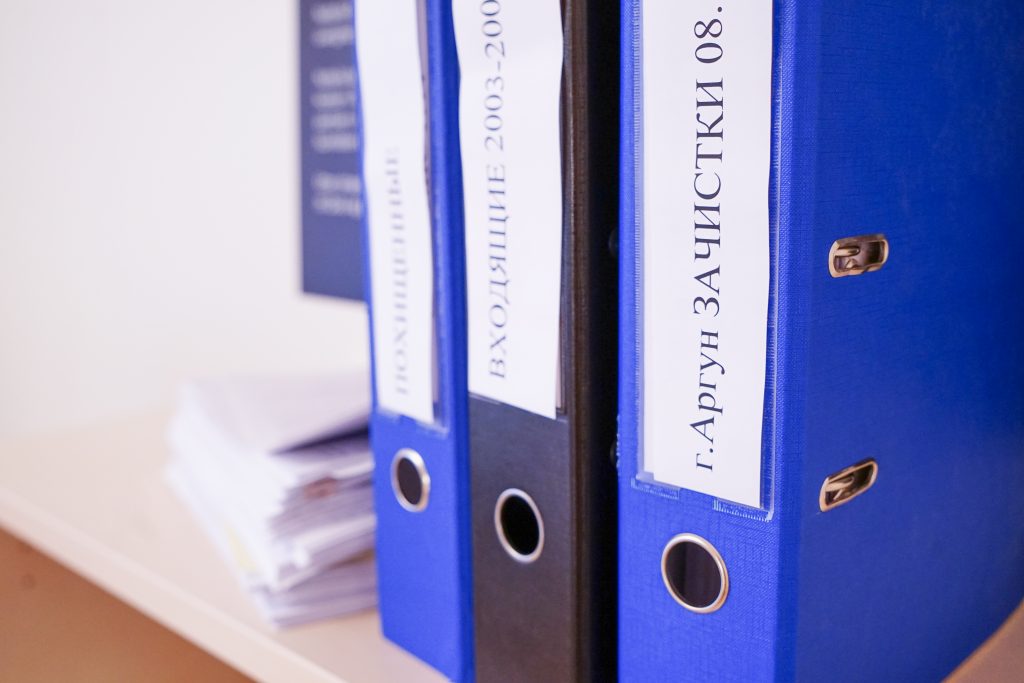The Natalia Estemirova Documentation Center (hereinafter the Documentation Center) was established in 2010, through the cooperation of a number of international and Russian human rights organizations to ensure the documentation of grave human rights violations in the North Caucasus.
The Documentation Center’s activities are guided by standards of international human rights, humanitarian and criminal law. The fundamental principle of our work is the vision that lasting peace in the North Caucasus is impossible without justice, the establishment of truth and the preservation of a factual history of the armed conflicts of the 1990s and 2000s.
The Center promotes the analysis of facts, particularly the collection and processing of statistical data on killed and missing persons – or victims of other serious violations of human rights – and the overall understanding of conflicts and their consequences for the entire region and population.

The objectives of the Documentation Center are:
- To preserve historical memory and assist victims of the conflicts in their search for truth and justice;
- To become a leading depository of documentation on international crimes and serious violations of human rights and humanitarian law in the North Caucasus;
- To facilitate the availability of documentation in archives, websites and publications;
- To contribute to eliminating impunity and strengthening the rule of law;
- To contribute to the establishment of justice and lasting peace in the North Caucasus;
- To become a trusted international authority and resource center for non-governmental organizations on matters of methodologies for the documentation of violations;
- To interact with governmental, intergovernmental and non-governmental organizations, universities and research institutes;
- To support and contribute to scientific research in various disciplines, such as contemporary history, sociology, anthropology, and international law; and
- To strengthen the capacity of, and provide training to, human rights organizations involved in the documentation of international crimes, and serious violations of human rights and humanitarian law.
The following human rights organizations are members of the Advisory Council of the Documentation Center:
| Norwegian Helsinki Committee (Norway) |
| Centre de la Protection Internationale (France and Russia) |
| Memorial Human Rights Centre (Russia) |
| Stichting Justice Initiative (Netherlands) |
| Committee against Torture (Russia) |
| Human Rights Watch |
| International Federation of Human Rights, FIDH |
| Civil Rights Defenders (Sweden) |
The Documentation Center began its work with the collection of materials provided by human rights organizations. Following years of activity in the North Caucasus, these organizations published large amounts of various types of documents, including: eyewitness and victim testimonies, audio and video evidence of incidents, descriptions of various events, as well as official correspondence with state authorities concerning various incidents. All of these materials are subsequently collected by the Documentation Center for archiving and further use by researchers, historians and lawyers.
The second phase of the Center’s work involves describing and systematizing the materials received, identifying victims and incidents, and registering this data in the electronic database. Analysts have worked hard compiling materials from various organizations – including data from state and international organizations – determining the number of victims described in separate incidents and verifying the information. For the first time, materials registered in the electronic database provide a more or less accurate figure of the number of civilian casualties of the second armed conflict in the North Caucasus (the majority of the materials relating to the first Russian-Chechen war, as well as the Ossetian-Ingush conflict, are yet to be analyzed). It has become possible to determine the minimum number of incidents during which human rights violations occurred, including the varying degrees of destruction and looting of property.
Some components of these activities are presented on our website. In the “Search” section one can find a description of incidents during which certain crimes against civilians were committed. Statistical data and the analysis of various types of violations can be found under “Publications”. Based on 33,320 documents registered in the Database, more than 5,794 incidents have been identified and described by the Center’s analysts. Currently, the interactive website map illustrates a number of these incidents. However, this will continue to be updated with descriptions of other incidents and new publications.

The Documentation Center is named after the well-known Chechen human rights defender Natalia Estemirova, who was abducted and killed on 15 July 2009. The materials of her work are partially analyzed and registered in our electronic database. There are also testimonies of our other friends and colleagues who gave their lives to the struggle for truth and justice. We hope that the activities within the framework of our project will be commemorative of their courage.
